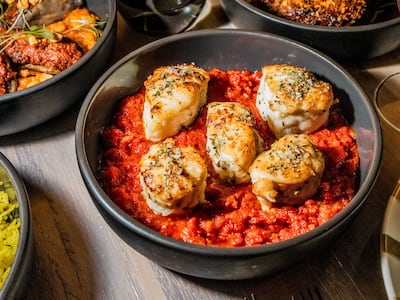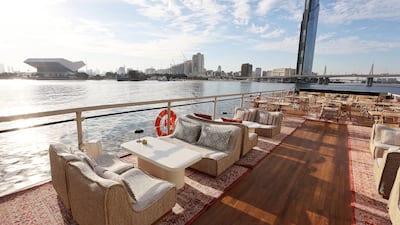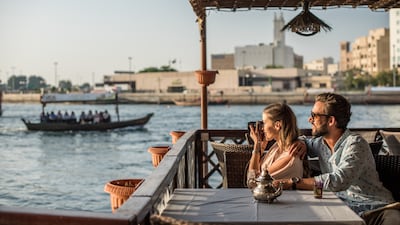A wooden dhow gleams on the waters surrounding Dubai Festival City Mall, lacquered teak panels reflecting the amber glow of its lights.
Ascending the steps to board Lady Nara to sample Nara on the Sea, Dubai's newest dinner cruise that launches on Saturday, I notice the meticulous attention to detail: wooden slats line the ceiling; table arrangements are thoughtfully spaced out; cushioned banquettes are adorned with patterned throw pillows; and rattan chairs are complemented by hues of terracotta, cream and sage.
Right off the bat, it’s clear Nara on the Sea isn’t a run-of-the-mill touristy dinner cruise with endless buffet lines and speakers cranked up.
I make my way to the best seat in the house, the open-air upper deck that benefits from the breeze coming off the water. While shawls are available to borrow, dressing warmly is recommended in the evening chill of this season.
The deck has a number of circular and rectangular tables that will suit a variety of diners, from couples and families to larger groups. There is also plush low-seating complete with comfortable cushions and Persian-style rugs peppered throughout.
Nara on the Sea offers two cruises: the sunset one typically starts at 4pm, but can fluctuate depending on seasonal variations. Priced at Dh390 a head, this one mainly serves canapes. Dishes include salmon toast with lemon cream cheese and sumac; Mandarin-infused lemon chicken; panipuri with guacamole; and an assorted macaroon box.
I am on the dinner cruise, though, which sets sail at 8pm. Upper deck seats cost Dh690 per person, while those dining on the lower deck will pay Dh590. Both cruises clock in at about two hours, which feels just right – it's long enough to savour the experience without giving off the “I’m stranded on a floating restaurant” feels.
Once everyone is seated, the dhow eases away from the dock, its journey weaving through Dubai Creek before entering Dubai Water Canal in the Business Bay area – and the dinner service begins.
First to arrive at my table is a crudites platter with different bread options, and fresh and lightly spiced vegetables. The accompanying pink hummus and labneh olive dip are a satisfying prelude – earthy, creamy and briny. The background music is also perceptible at this point – it's low enough to allow table chatter, but equally swooning along to Whitney Houston's soaring lyrics is an option.
As the dhow sails further into the canal, the starters arrive. The beef bresaola carpaccio, with its paper-thin slices, is subtly smoky and pairs beautifully with a tangy confit tomato and balsamic glaze. Other options include artichoke and courgette carpaccio, and a classic Mediterranean salad. One is rich, the other light.
The showstopper among the appetisers is a salad of red snapper fish – the meat is lightly poached and delicately seasoned – perched on a bed of baba ganoush. The smoky, velvety eggplant puree anchors the dish, its depth of flavour harmonising with the snapper's subtle sweetness.
Mains are served as the dhow reaches its halfway point near Burj Khalifa. The three dishes – black cod, braised veal and pepper mechouia – arrive simultaneously and are accompanied by a plate of saffron rice.
The black cod, sitting on top of spiced tomato sauce, is tender yet firm, its flavours bolstered by the bright acidity of the sauce. The roasted vegetable medley is vibrant yet smoky, with the eggplant makdous walnut adding textural flair.
The star dish among the mains is the slow-cooked braised veal, which is tender and perfectly caramelised in a velvety sauce with a punch of garam masala.
As the dhow turns back towards Festival City, dessert is presented – pistachio cake with raspberry sorbet. It makes for a satisfying end to the meal, although I was hoping for a more memorable sweet finale.
Given the kitchen limitations and logistical constraints on-board a dhow, the overall quality, temperature, presentation and service of the dishes are a testament to the skill of the chef and his team. Throughout the meal, I am struck by the seamless interplay of the setting and the cuisine.
Without the crutch of a buffet, the team delivers a plated experience that can rival many of Dubai’s land-based restaurants.
In a fitting end to the evening, the dhow’s return to the dock coincides with a crescendo of lights and music from Festival City’s nightly water show. I linger on for a moment on the quay, watching the show light up the dhow gently bobbing in the water.
Nara on the Sea sails daily at 4pm and 8pm. For reservations, call 050 336 7909
The burning issue
The internal combustion engine is facing a watershed moment – major manufacturer Volvo is to stop producing petroleum-powered vehicles by 2021 and countries in Europe, including the UK, have vowed to ban their sale before 2040. The National takes a look at the story of one of the most successful technologies of the last 100 years and how it has impacted life in the UAE.
Read part four: an affection for classic cars lives on
Read part three: the age of the electric vehicle begins
Read part one: how cars came to the UAE
57%20Seconds
%3Cp%3E%3Cstrong%3EDirector%3A%3C%2Fstrong%3E%20Rusty%20Cundieff%0D%3Cbr%3E%3Cstrong%3EStars%3A%20%3C%2Fstrong%3EJosh%20Hutcherson%2C%20Morgan%20Freeman%2C%20Greg%20Germann%2C%20Lovie%20Simone%0D%3Cbr%3E%3Cstrong%3ERating%3A%20%3C%2Fstrong%3E2%2F5%0D%3Cbr%3E%0D%3Cbr%3E%3C%2Fp%3E%0A
More from Neighbourhood Watch:
Jetour T1 specs
Engine: 2-litre turbocharged
Power: 254hp
Torque: 390Nm
Price: From Dh126,000
Available: Now
KILLING OF QASSEM SULEIMANI
The five pillars of Islam
Fitness problems in men's tennis
Andy Murray - hip
Novak Djokovic - elbow
Roger Federer - back
Stan Wawrinka - knee
Kei Nishikori - wrist
Marin Cilic - adductor
THE SPECS
Engine: 1.5-litre turbocharged four-cylinder
Transmission: Constant Variable (CVT)
Power: 141bhp
Torque: 250Nm
Price: Dh64,500
On sale: Now
The five pillars of Islam
Killing of Qassem Suleimani
Killing of Qassem Suleimani
Hydrogen: Market potential
Hydrogen has an estimated $11 trillion market potential, according to Bank of America Securities and is expected to generate $2.5tn in direct revenues and $11tn of indirect infrastructure by 2050 as its production increases six-fold.
"We believe we are reaching the point of harnessing the element that comprises 90 per cent of the universe, effectively and economically,” the bank said in a recent report.
Falling costs of renewable energy and electrolysers used in green hydrogen production is one of the main catalysts for the increasingly bullish sentiment over the element.
The cost of electrolysers used in green hydrogen production has halved over the last five years and will fall to 60 to 90 per cent by the end of the decade, acceding to Haim Israel, equity strategist at Merrill Lynch. A global focus on decarbonisation and sustainability is also a big driver in its development.
The years Ramadan fell in May
Why does a queen bee feast only on royal jelly?
Some facts about bees:
The queen bee eats only royal jelly, an extraordinary food created by worker bees so she lives much longer
The life cycle of a worker bee is from 40-60 days
A queen bee lives for 3-5 years
This allows her to lay millions of eggs and allows the continuity of the bee colony
About 20,000 honey bees and one queen populate each hive
Honey is packed with vital vitamins, minerals, enzymes, water and anti-oxidants.
Apart from honey, five other products are royal jelly, the special food bees feed their queen
Pollen is their protein source, a super food that is nutritious, rich in amino acids
Beewax is used to construct the combs. Due to its anti-fungal, anti-bacterial elements, it is used in skin treatments
Propolis, a resin-like material produced by bees is used to make hives. It has natural antibiotic qualities so works to sterilize hive, protects from disease, keeps their home free from germs. Also used to treat sores, infection, warts
Bee venom is used by bees to protect themselves. Has anti-inflammatory properties, sometimes used to relieve conditions such as rheumatoid arthritis, nerve and muscle pain
Honey, royal jelly, pollen have health enhancing qualities
The other three products are used for therapeutic purposes
Is beekeeping dangerous?
As long as you deal with bees gently, you will be safe, says Mohammed Al Najeh, who has worked with bees since he was a boy.
“The biggest mistake people make is they panic when they see a bee. They are small but smart creatures. If you move your hand quickly to hit the bees, this is an aggressive action and bees will defend themselves. They can sense the adrenalin in our body. But if we are calm, they are move away.”
Diriyah%20project%20at%20a%20glance
%3Cp%3E-%20Diriyah%E2%80%99s%201.9km%20King%20Salman%20Boulevard%2C%20a%20Parisian%20Champs-Elysees-inspired%20avenue%2C%20is%20scheduled%20for%20completion%20in%202028%0D%3Cbr%3E-%20The%20Royal%20Diriyah%20Opera%20House%20is%20expected%20to%20be%20completed%20in%20four%20years%0D%3Cbr%3E-%20Diriyah%E2%80%99s%20first%20of%2042%20hotels%2C%20the%20Bab%20Samhan%20hotel%2C%20will%20open%20in%20the%20first%20quarter%20of%202024%0D%3Cbr%3E-%20On%20completion%20in%202030%2C%20the%20Diriyah%20project%20is%20forecast%20to%20accommodate%20more%20than%20100%2C000%20people%0D%3Cbr%3E-%20The%20%2463.2%20billion%20Diriyah%20project%20will%20contribute%20%247.2%20billion%20to%20the%20kingdom%E2%80%99s%20GDP%0D%3Cbr%3E-%20It%20will%20create%20more%20than%20178%2C000%20jobs%20and%20aims%20to%20attract%20more%20than%2050%20million%20visits%20a%20year%0D%3Cbr%3E-%20About%202%2C000%20people%20work%20for%20the%20Diriyah%20Company%2C%20with%20more%20than%2086%20per%20cent%20being%20Saudi%20citizens%0D%3C%2Fp%3E%0A
Essentials
The flights: You can fly from the UAE to Iceland with one stop in Europe with a variety of airlines. Return flights with Emirates from Dubai to Stockholm, then Icelandair to Reykjavik, cost from Dh4,153 return. The whole trip takes 11 hours. British Airways flies from Abu Dhabi and Dubai to Reykjavik, via London, with return flights taking 12 hours and costing from Dh2,490 return, including taxes.
The activities: A half-day Silfra snorkelling trip costs 14,990 Icelandic kronur (Dh544) with Dive.is. Inside the Volcano also takes half a day and costs 42,000 kronur (Dh1,524). The Jokulsarlon small-boat cruise lasts about an hour and costs 9,800 kronur (Dh356). Into the Glacier costs 19,500 kronur (Dh708). It lasts three to four hours.
The tours: It’s often better to book a tailor-made trip through a specialist operator. UK-based Discover the World offers seven nights, self-driving, across the island from £892 (Dh4,505) per person. This includes three nights’ accommodation at Hotel Husafell near Into the Glacier, two nights at Hotel Ranga and two nights at the Icelandair Hotel Klaustur. It includes car rental, plus an iPad with itinerary and tourist information pre-loaded onto it, while activities can be booked as optional extras. More information inspiredbyiceland.com
Killing of Qassem Suleimani
More from Neighbourhood Watch:











